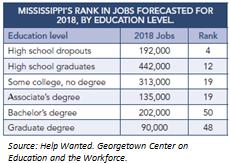By 2018, Mississippi will have 128,000 new jobs in its economy. Of the new jobs, 73,000 will require a post-secondary education, while jobs for high school graduates and dropouts will grow by 55,000. As the table shows, this places Mississippi within the top 5 states that will see an increase in jobs not requiring a high school diploma. This labor forecast presents both challenges and opportunities for Mississippi. With a higher concentration in jobs for high school dropouts/graduates Mississippi will be challenged to reconcile that these jobs are typically low-skill, low-pay employment that often results in workers having to utilize public benefit programs. The labor forecast also presents an opportunity for Mississippi, indicating that post-secondary credentials will provide the training needed to both fill several of the trending occupations in the state while attracting new industry and jobs. These jobs will provide good wages that allow families to be self-sufficient, but will also require a modern labor force that has the skills needed to succeed.
Raising the skill level of Mississippi’s workforce will not be an overnight fix; however, there are key investments that can be made now to capitalize on the opportunity. First, Mississippi’s community college system must be given more resources to handle a growing student population unable to pay for higher education. With funding of state aid programs remaining relatively flat, along with Federal Pell Grant changes that will result in thousands of Mississippi students losing their financial aid, community colleges are placed in a precarious financial position. With the costs of higher education rising, and state funding remaining stagnant, Mississippi colleges have had to turn to tuition increases to make up for the shortfall. Second, Mississippi must move to incorporate high school graduates and dropouts into its modern economy. Nearly 1 in 6 adults do not have a high school education or GED in Mississippi. This group is a potential economic resource for Mississippi, but they must be provided skill training. Mississippi must devote resources toward developing new models in developmental education which will create pathways for adults to acquire training for in demand careers that pay good wages.
Nationally, labor trends are demanding a more flexible, skilled worker. With the right investments, Mississippi has an opportunity to create a workforce that is well-positioned to absorb market needs as well.







